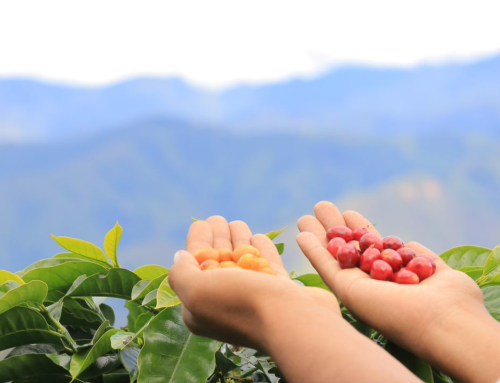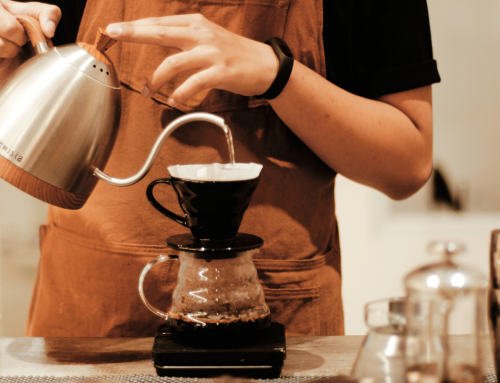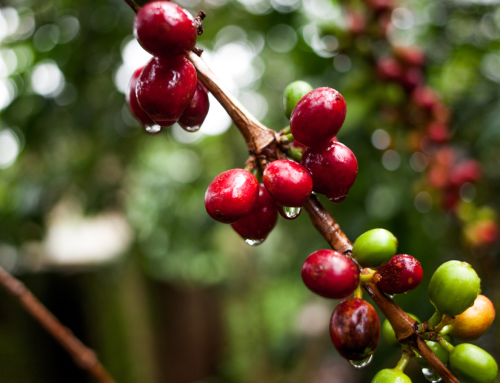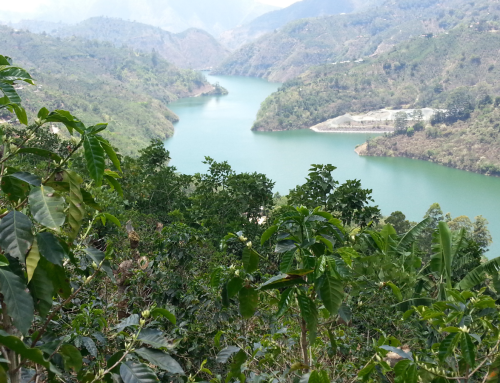Riley Thomson, head of the Volcafe Way program in Costa Rica, recently interviewed Carol Mata Gutierrez, a coffee producer in Tarrazú, about how coffee farming has changed — and what she hopes more producers will come to understand. In addition to agronomy strategies, a major focus of Volcafe Way is sharing business best practices with producers — a message that resonates with Carol, who has a college degree in accounting.*
Does the farm have a name?
Yes, Finca M&B.
What is the area of the farm?
5.5 hectares.
What varieties of coffee do you have on the farm?
There is a bit of everything: Caturra, Catuaí, Catimor, Moca, Arabico, Mundo Nuevo…
For how long have you owned the farm?
Seven years.
How did this all begin seven years ago?
As my father got older, he got tired of struggling with the coffee crop. He decided to split the farm between me and my siblings, so we began to learn about farming through trial and error. More errors than trails, in reality! But it has been a real learning experience. I grew up on coffee farms but was never directly involved in maintaining the crop. So there was a lot to learn, especially since my father’s techniques had become obsolete. As the climate and soil changed and the plantation aged, the crops no longer responded like they did in his time. It has been a real challenge.
What do think of the current coffee market/ industry?
The market is bad. Coffee is not very profitable! I believe the administrative side of farming has become the key. We have to manage our resources the best way possible in order to ensure profitability. Farmers tend to be more concerned about agricultural inputs, thinking that by spending more they will have higher yields. They tend to have real administrative deficiencies and are not concerned by their production costs. In the end, many famers have costs that surpass their income, and it doesn’t work that way. We do not understand coffee as a business and how these inputs are affecting our income. We need to understand our farms better and apply our knowledge in the best possible way.
“There was a lot to learn, especially since my father’s techniques had become obsolete.”

Coffee farms in Tarrazú, Costa Rica.
Have you seen changes in these conditions over the past seven years?
What has changed the most is the climate. Pest and diseases are not the same as they used to be. They are more constant and aggressive. Now we have learned to prevent these issues. The incredible amount of rainfall recently has a negative effect on coffee production.
Has the increase rainfall affected your cost or productivity? For instance, do you have to apply more inputs to prevent diseases? Or does it reduce the effectiveness of your fertilizers?
It clearly does affect us. However, if you learn to carry out the [leaf rust] applications preventively — instead of trying to control the disease once it is already developed — and to apply the fertilizers at the correct moment, the impact can be reduced drastically. One must foresee these changes in climate and learn to prevent the issues they can cause on our farms. So again, l believe it’s all about learning to read our farms and knowing what they need and when they need it.
How long have you been selling your coffee to Volcafe, and how did you become a part of the Volcafe Way?
I have been selling coffee to Volcafe for the past five crop years. Initially I was participating in a sustainable coffee program with Volcafe that allowed me to improve many of my farm practices. Later, I was invited to participate in the Volcafe Way, and it has been a very nice experience.
What do you feel has been the most significant contribution of the Volcafe Way to you and your farm?
What I value the most about the Volcafe Way is the support we receive. That is really the reason I decided to participle in the first place. I’ve always believed that we, coffee farmers, need to be taught. Everything changes, from the weather to the coffee plant, to the soil. We need constant follow up and advice in order to continue being successful.
What convinced you to become a business-model farmer for Volcafe Way?
I am winning, because I am learning from the process and you are also learning by putting the different farming practices in place on my farm. It isn’t a model farm because it is the best farm in the region, but because there is so much work to be done to improve it. I am learning and it will allow other farms to come and see for themselves that the technologies and practices we are putting in place are working.

A signs marks the farm of Carol Gutierrez as a Volcafe Way business-model farm.
Which farming practices recommended to you through the Volcafe Way have been especially helpful in improving the condition of your farm?
In our case I would say pruning and new shoot selection. My father used to allow all of the new shoots to grow, and this has been very difficult to recover from. In fact, we are still working on correcting this issue. It has been difficult to change, but the results are easy to see in the yields and the vitality of the plants. The way we manage shade and apply fertilizers has also changed, and generally speaking, we have achieved a more balanced system.
Is it normal for farmers to share knowledge and experiences in this region? Or are most farmers working by themselves?
That is complicated in this region. Most people rely on the traditional farming methods and are closed to new techniques. Most farmers are not open to change or to sharing their experiences. I believe the new generation of young farmers is beginning to change this, as they are willing to receive training and investigate new techniques. As a result, they are learning to see their plantations differently.
Do you think it is better to stick to the traditional way of coffee farming or to be more open to change and sharing of experiences?
I think it’s better to share experiences, that way we all learn. Not necessarily everything I do will work for the next farmer, but usually with a little adjustment it will have a good result. Besides, we need to stick together as farmers. There aren´t that many coffee farmers left, as many of them have moved on to different economic activities, or have sold or urbanized their farms. For me that is a huge mistake, because I believe that coffee farming can be sustainable in the long term, but only if we do things correctly. •
*Pictured are Carol and Rich Futrell, Genuine Origin’s Midwest partnership manager, on Carol’s farm in February 2017.






